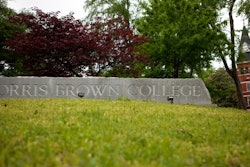Gateway 21 Opens Access to Knowledge
Dr. Morris Simon is accustomed to using obscure and hard-to-find academic journals in his research as an anthropologist and international studies professor at Stillman College. Recently, articles in the Mississippi Valley Historical Review dating back to the 1930s have helped him to identify primary sources for research on Red Shoe, an 18th century Choctaw Indian leader about whom Simon intends to write.
When the libraries of small private colleges fail to carry back issues of obscure journals, professors such as Simon — and students — are forced to seek the material through interlibrary loans from much larger institutions.
At the Stillman College library, however, Simon uses an electronic database called JSTOR that gives him ready access to back issues of more than 100 academic journals, including editions of the Mississippi Valley Historical Review that contains research on 18th century Mississippi Valley Indians.
For a small, private Black college such as Stillman, with an enrollment of 1,014 students, having access to a resource the caliber of JSTOR is a rare luxury.
“[JSTOR is] really a treasure,” Simon says, adding that it’s also rare for small colleges to have extensive hard-copy collections of more than a handful of academic journals.
Stillman is one of 22 private, historically Black institutions (HBCUs) that has been given the opportunity to access JSTOR thanks to a technology partnership with the Atlanta-based Southern Education Foundation (SEF) that is currently funded by the Andrew W. Mellon Foundation.
The two-year old partnership, known as the Gateway 21 project, consists of a consortium of 22 institutions. The participating campuses have secured computers as well as Internet and JSTOR access. They have also received funds to train faculty to use these technology resources.
Considered a progressive organization that has historically centered on social and economic justice issues, SEF’s foray into the information technology arena is geared to help HBCUs keep up with better financed, traditionally-White institutions, according to Dr. Nathaniel Jackson, senior program officer at SEF and the Gateway 21 program coordinator.
“SEF was becoming concerned about helping Black private institutions close the technology gap,” he says.
Jackson explains that Gateway 21’s JSTOR initiative springs directly from the Black College Library Improvement Program SEF had managed for 11 years with financial support from Mellon. The BCLIP project had assisted Black college libraries with book purchasing, according to Jackson.
A few years ago, after librarians told SEF officials that they needed help getting their libraries automated, SEF began considering how it could help.
Mellon funded the Gateway 21 project with a $2 million grant to get the JSTOR initiative underway. The grant paid for dozens of new computers for the libraries, wiring for some campuses, JSTOR training, and JSTOR access fees. Jackson estimates that funding has averaged between $40,000 to $45,000 per campus. The annual value of JSTOR access is between $2,000 and $4,000 per campus for Gateway 21 insitutions.
Nearing the end of its second year, the JSTOR initiative is drawing appreciative raves from officials at participating institutions.
Robert Heath, director of the Stillman College library, praises the JSTOR initiative for making the database “accessible and convenient.”
“As small a school as Stillman is, we could not afford to buy these journals,” Heath says.
The JSTOR program allowed the college to obtain 27 computers for the main library and an additional 16 for campus computer labs, he says. The computer acquisition authorized by JSTOR also created enthusiasm among campus administrators for the college’s overall acquisition of computer terminals.
“What we got was a great shot in the arm with JSTOR,” Heath says, adding that Stillman has a total of 320 computer terminals available to its students.
Established by the Mellon Foundation in 1995, JSTOR made its holdings of online, academic journals available to libraries for the first time in early 1997. The idea for the database originated with Dr. William G. Bowen, president of the Mellon Foundation. Bowen wanted to help institutions with library-storage problems find a solution to handling the back issues of academic journals. That interest led Mellon to develop JSTOR, which currently includes back issues of 117 academic journals and is run as a non-profit entity.
Gateway 21 school officials are hoping to receive additional funding from Mellon to pay for continued access to JSTOR. The original agreement had the schools receiving JSTOR access free of charge for two academic years. Though additional support is not guaranteed, several school officials say their institutions will pay for the service without help from Mellon.
Earlier this year, Mellon funded a $300,000 program that will teach faculty at several Gateway 21 schools how to integrate computers, the Internet, and other interactive technology into classroom instruction, Jackson reports.
Information about JSTOR can be accessed at <www.jstor.org> on the World Wide Web.
© Copyright 2005 by DiverseEducation.com





















